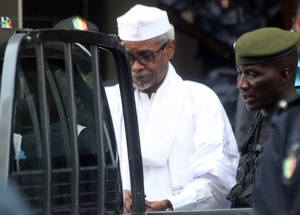African Rights Groups Back Habre Court
141 Organizations From 32 Countries Praise Senegal, AU Effort
141 African human rights groups from 32 countries today issued an open letter expressing support for the efforts by Senegal and the African Union to prosecute crimes committed during the rule of former Chadian president Hisséne Habré.

Former Chadian dictator Hissene Habre is escorted by military officers after being heard by judge in Dakar, Senegal on July 2, 2013.
Habré, who is accused of thousands of political killings and systematic torture from 1982 to 1990, was indicted in July 2013 by the Extraordinary African Chambers created by Senegal and the African Union, and is now in pretrial detention. If the judges decide that a trial is warranted, the case is scheduled to begin in early 2015.
“A fair and transparent trial for Mr. Habré, should the evidence support the case going forward, would be a milestone in the fight to hold accountable the perpetrators of atrocities,” the letter says.
“While some African leaders have claimed that Africa is unfairly targeted by international courts, a challenge has been to put teeth into African justice,” said George Kegoro, executive director of the International Commission of Jurists-Kenya, one of the letter’s signatories. “This case could help to do that.”
Victims of crimes committed during Habré’s rule have campaigned for 25 years to bring him to court. But it was only in 2012 that the International Court of Justice enjoined Senegal to begin proceedings against Habré “without further delay” if it did not extradite him, and the new Senegalese government of Macky Sall promised to organize a trial.
“Hisséne Habré’s victims have been tenacious in their struggle to bring him to justice,” said Yasmin Sooka, director of the Foundation for Human Rights in South Africa. “It is crucial for the trial and prosecutorial process to be exemplary, as it would send an important signal that it is possible to hold perpetrators to account in Africa and that victims of serious violations in Africa also matter.” Sooka was a member of the South African Truth and Reconciliation Commission (TRC) and later of the Truth and Reconciliation Commission in Sierra Leone.
The open letter also calls on the government of Chad to provide fair and transparent trials for officials from Habré’s administration who are facing charges there, including two who are also being sought by the chambers’ prosecutor. Those trials are scheduled to begin on November 13th.
The signatories of the letter include the leading human rights organizations in Chad and Senegal.
Open letter on the case of Hisséne Habré and the Extraordinary African Chambers
We support an Africa fighting against impunity!
We, African NGOs, write to support the efforts by Senegal and the African Union to prosecute the worst international crimes committed during the government of former Chadian president Hisséne Habré and to urge the government of Chad and all African governments fully to cooperate with those efforts.
Habré’s government is alleged to have committed thousands of political killings and systematic torture before Habré was overthrown and fled to Senegal in 1990. The survivors, widows and orphans have been tenaciously seeking justice for decades, but the previous government of Senegal threw up one obstacle after another. In 2012, however, following a ruling by the International Court of Justice enjoining Senegal to bring Habré to justice “without further delay,” the new government of Macky Sall promised to do so. The victims’ perseverance was finally rewarded when Senegal and the African Union established the “Extraordinary African Chambers in the courts of Senegal” to prosecute the “person or persons” most responsible for international crimes committed in Chad between 1982 and 1990. In July 2013, the Chambers charged Habré with crimes against humanity, torture and war crimes.
Since then, this innovative court has carried out four investigative missions in Chad and interviewed more than 2500 victims and witnesses. If the judges decide it is warranted, Mr. Habré’s trial is scheduled to begin in May 2015.
The Chambers’ chief prosecutor has also requested the indictment of five further officials from Mr. Habré’s administration suspected of being responsible for international crimes. Two of them have been in detention in Chad since 2013 on charges stemming from complaints filed in 2000 by Habré-era victims in the Chadian courts. In October 2014, the Chadian government announced that the two men would be prosecuted in Chad, where a court in October 2014 held them over for trial, along with 27 other security officials. It is essential that the Chadian trials of members of Mr. Habré’s administration, for which the victims have campaigned so long, meet international standards of transparency and not be a simple pretext for the non-transfer of the accused persons to Dakar.
A fair and transparent trial for Mr. Habré before the Extraordinary African Chambers, should the evidence support the case going forward, would be a milestone in the fight to hold accountable the perpetrators of atrocities. Senegal would be the first country in the world whose courts tried the leader of another country for alleged grave crimes under international law. It would also show that African courts are capable of to providing justice for African victims for crimes committed in Africa.
We are pleased to support an Africa which fights against impunity.
Source: Human Rights Watch
- 459 reads
Human Rights
Fostering a More Humane World: The 28th Eurasian Economic Summi

Conscience, Hope, and Action: Keys to Global Peace and Sustainability

Ringing FOWPAL’s Peace Bell for the World:Nobel Peace Prize Laureates’ Visions and Actions

Protecting the World’s Cultural Diversity for a Sustainable Future

Puppet Show I International Friendship Day 2020

